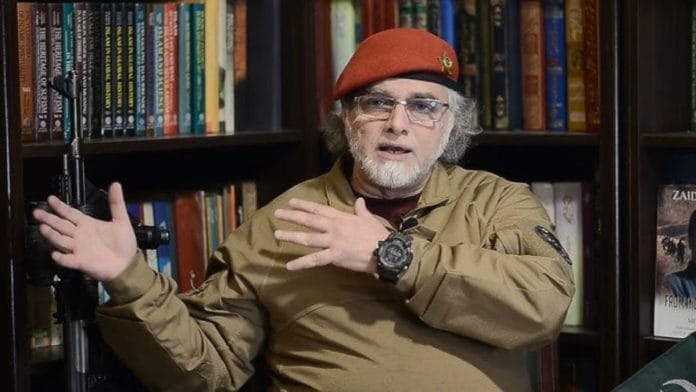New Delhi: Hours after India blocked access to 16 Pakistani YouTube channels in the wake of the Pahalgam terror attack, Shehzad Ghias, host of the independent podcast The Pakistan Experience, asked a pointed question. Why is a Right-wing ideologue like Zaid Hamid still frequently being seen on Indian primetime shows, espousing anti-India rhetoric and freely accessible, while liberal voices like Ghias are taken down?
“What I find funny is if the idea is that Pakistan is saying something against India or spreading fake news or hatred, then why is Zaid Hamid’s channel not banned?” Ghias told ThePrint. “Clearly, what you’re trying to put out yourself does not stand up to evidence.”
Citing national security concerns, New Delhi ordered YouTube to block access of channels it accused of spreading “provocative and communally sensitive content” on 28 April.
The crackdown was sweeping: major news networks like Dawn, ARY News, Samaa TV and Bol News were blacklisted, alongside journalists like Asma Shirazi and Umar Cheema. Even sports channels and independent podcasts like The Pakistan Experience were blocked.
Shirazi called the move a blow to the values India claims to uphold.
“I cover political, regional, and international affairs without resorting to jingoism or hate. I have consistently been a strong voice for peace in the region,” she said.
She plans to formally protest the decision. “A country that calls itself the world’s largest democracy should have the courage to hear perspectives from across the border,” she said. “This ban only exposes the hollowness of India’s claims to democracy and free speech.”
For Ghias, the inclusion of apolitical platforms in the ban list revealed a deeper political intent.
“The intentions were purely political — to throttle any independent opinion coming out of Pakistan. It’s almost senseless to include a sports channel in that as well,” he said.
More than the bans themselves, Ghias found the selectivity troubling.
“When you see some shows like Arnab [Goswami’s], the Pakistani representatives they invite are usually people who spew hatred against India,” he said. “The idea sold is that all Pakistanis want to conquer India and hoist their flag in New Delhi.”
Also read: Pakistani media is in denial mode on Pahalgam, busy correcting Indian TV anchors’ Urdu
Big Tech’s complicity
The role of Big Tech companies like YouTube in complying with government takedown requests is another part of the story.
“Big markets like India have sent requests in the past. They want to comply,” Ghias said. He has little faith in big tech. “They’re not going to anger the Indian government over The Pakistan Experience or Dawn.”
Ghias also said he would file an appeal with YouTube but had little hope for success. “Do I expect it to change anything? No,” he added.
But the numbers speak for themselves.
Before the ban, about 30 per cent of the podcast’s listeners came from India, another 35 per cent from Pakistan, and the rest from the diaspora, Ghias estimated — though he cautioned that the numbers were rough. Of course, the ban will cut into his audience base, particularly among more casual viewers.
“Sometimes I do these live sessions, and there are people who’ve joined from villages in India that I’ve never even heard of. I’m surprised myself. I’m like, are you watching from there?”
He predicts that while some users may be permanently lost, many will adapt — much as they did in Pakistan after similar restrictions.
“I think our dedicated audience will probably use VPNs. There’s an X ban in Pakistan for two years. Who doesn’t use X?” he added.
For Ghias, the bigger concern is not just lost viewership, but the slow, quiet erasure of dialogue — the kind that made the idea of peace a little more imaginable.
Podcasts like his, he argued, offered a counter-narrative — a Pakistan of artists, comedians, politicians, and regular citizens living beyond the stereotypes.
“Our shows break that singular notion of Pakistanis that has been sold for ages. You see people having fun, enjoying cricket matches together — to an outsider, you wouldn’t even know there’s any antagonism between the two countries,” Ghias said.






